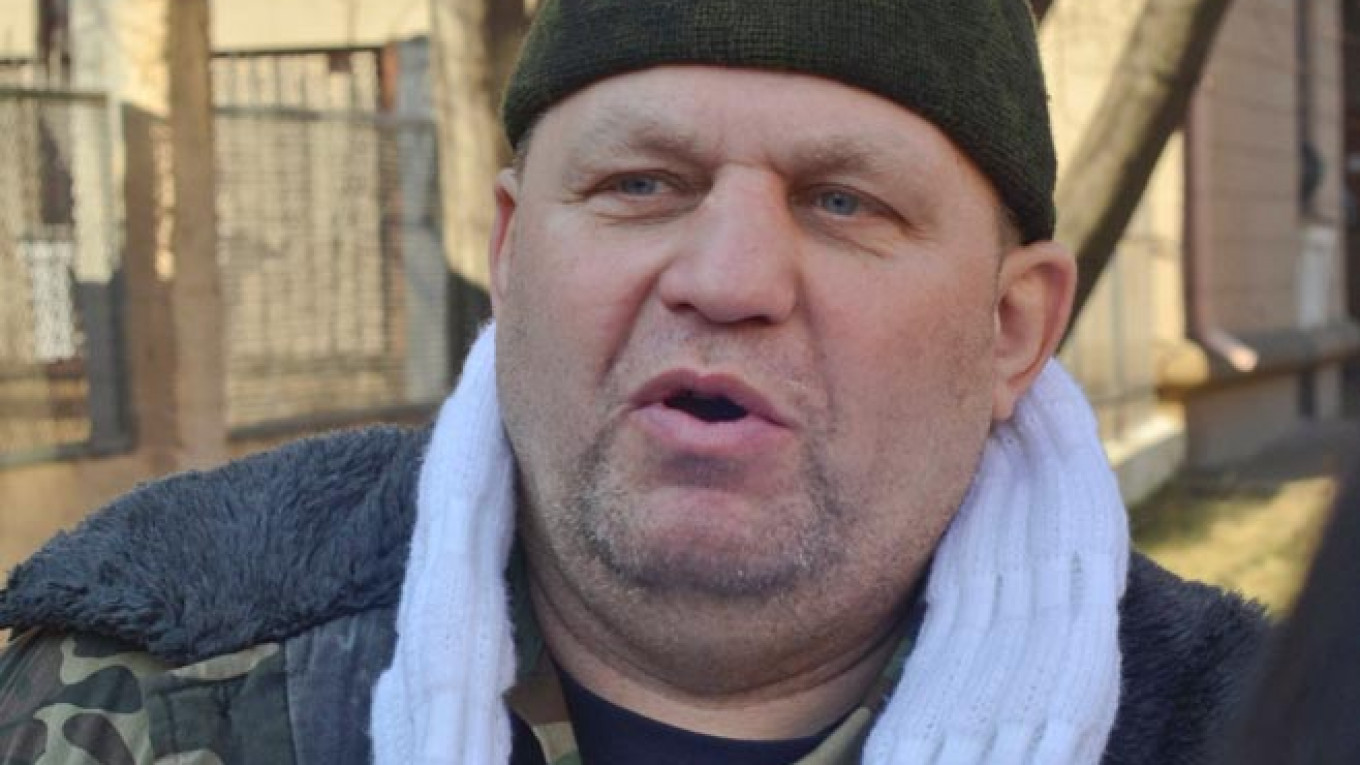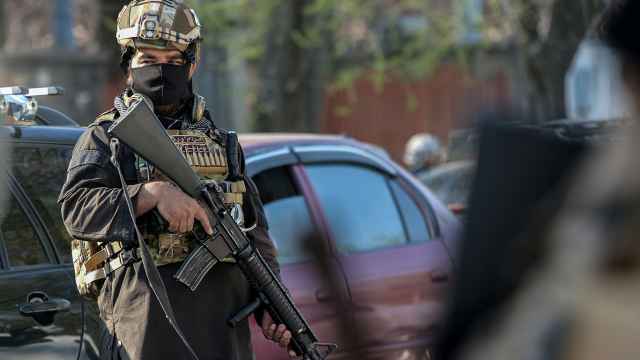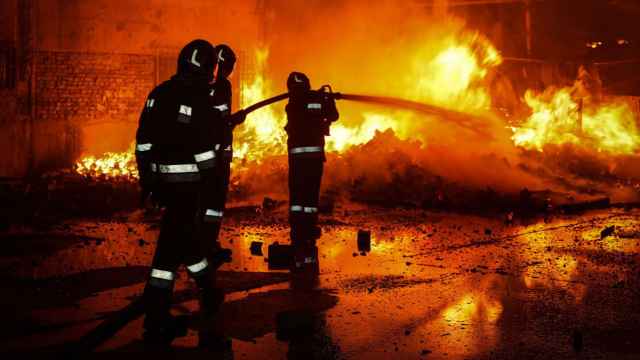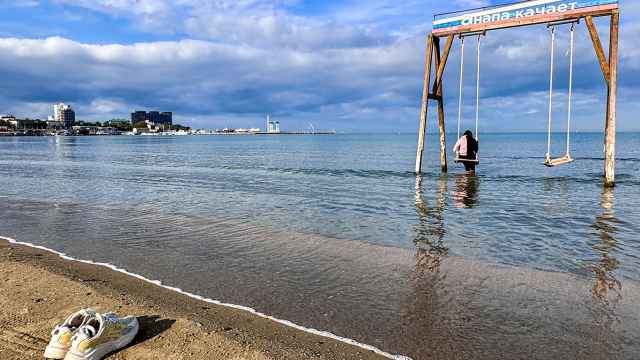A member of the Ukrainian nationalist group that played a major role in the ouster of President Viktor Yanukovych last month was killed by police Tuesday, triggering fears that relations between the government in Kiev and ultranationalist organizations could be aggravated.
Some representatives of Right Sector promised to take revenge against the Interior Ministry after the killing in the city of Rivne of Oleksandr Muzychko, also known as Sashko Bily.
Muzychko had been a leader of Right Sector's Western Ukraine division since 2013 and was the head of the Rivne branch of a constituent member of Right Sector, the UNA-UNSO group, from 1997 until last month. He played a major role in the protest movement that led to a new government in Kiev, and his death has been seen by some as a possible excuse for the Kremlin to interfere politically or militarily in Ukraine.
The Interior Ministry issued a statement Tuesday saying that Muzychko had been killed during a police raid after putting up resistance and firing at officers.
"When members of an organized crime group were being detained, citizen Muzychko, also known as Sashko Bily, violently resisted arrest and injured a police officer," the ministry said. "The police had to fire their weapons, and three members of the organized crime group were transported to Kiev."
Police also detained Muzychko's bodyguards, who were armed with an AK-47 assault rifle and a Makarov pistol.
A criminal case had been opened against Muzychko for his beating of Andrei Targony, a prosecutor in the Rivne district, in February. According to the Interior Ministry, Muzychko had been notified about the case and then put on a wanted list.
Roman Koval, leader of Right Sector's Rivne branch, denied the ministry's version, however, placing full blame on the interior minister.
"We will take revenge on [Interior Minister] Arsen Avakov for the death of our brother," Koval said, as reported ChaRivne, a Rivne-based news portal. "The shooting of Sasha Bily is a murder ordered by the minister. He had not received any summons related to any criminal cases."
Koval accused the ministry of lying and said that Muzychko's hands were tied at the time he was shot, meaning he was not capable of threatening police.
Oleksandr Doniy, a deputy of the Supreme Rada, made a similar statement on his Facebook page, saying unknown assailants blocked Muzychko's car, dragged him out of the vehicle, cuffed his hands behind his back and then shot him twice in the chest.
Dmytry Yarosh, leader of Right Sector, also criticized police actions.
"We cannot silently observe the intense counterrevolutionary activities of Ukraine's Interior Ministry," Yarosh said at a news briefing, reported Interfax Ukraine. "We demand that Interior Minister Arsen Avakov immediately resign and that the commander of the Sokol Special Forces unit and all those linked to the murder be arrested."
Earlier this month, Muzychko had accused the Ukrainian Prosecutor General's Office and police of planning to kill him or capture him and hand him over to Russia. Russia's Investigative Committee initiated a criminal case against Muzychko in early March over his involvement in the first Chechen War.
Before Ukraine's Interior Ministry issued its statement on the shooting Tuesday, speculation swirled that the Kremlin was behind Muzychko's killing as the crisis between Russia and Ukraine heated up.
Korrespondent.net cited locals in Rivne as saying that he was killed by Russian agent provocateurs. Meanwhile, Zulikhan Magomadova, a Chechen blogger and acquaintance of Muzychko's, said in a LiveJournal post that the Kremlin killed Muzychko in an effort to launch a civil war in Ukraine and to prompt Right Sector to overthrow the current government, thereby giving Russia an excuse to seize another part of Ukraine after Crimea.
Andrei Illarionov, a former aide of President Vladimir Putin and currently a member of the opposition, echoed Magomadova's thoughts, saying in a blog post Tuesday that Muzychko's killing was aimed at provoking "civil strife" in Ukraine.
Vladimir Fesenko, head of the Penta political analysis group, said that the killing was unlikely to cause any major civil unrest, however.
Even if Right Sector tried to take revenge on the authorities, he said, its actions would not be supported by most of the population, and they would be seen as "traitors" indirectly aiding Russia.
"Right Sector's popularity is exaggerated by Russian propagandists," he said, noting that the current approval rating of Yarosh was only 1.6 percent.
Muzychko has been presented as a fascist thug by Russia's state-controlled television in its coverage of the Ukrainian crisis and apparent bid to portray the new government in Kiev as one dominated by ultranationalists.
The current Ukrainian government and many of the revolution's supporters have distanced themselves from Muzychko's activities and criticized him, however.
Born in Russia's Perm region in 1962, Muzychko emigrated to Ukraine in the early 1990s and subsequently fought against Russian troops in the first Chechen War in 1994 to 1996. He was awarded a medal by first Chechen President Dzhokhar Dudayev.
Since then, Muzychko has been the target of several criminal investigations.
In 1995, police started an investigation against Muzychko over his alleged beating of a visitor at a cafe in Rivne, while in 1997 he was investigated over a shootout in Kiev. In 2003 he was sentenced to three and a half years for allegedly kidnapping a businessman.
Contact the author at o.sukhov@imedia.ru
A Message from The Moscow Times:
Dear readers,
We are facing unprecedented challenges. Russia's Prosecutor General's Office has designated The Moscow Times as an "undesirable" organization, criminalizing our work and putting our staff at risk of prosecution. This follows our earlier unjust labeling as a "foreign agent."
These actions are direct attempts to silence independent journalism in Russia. The authorities claim our work "discredits the decisions of the Russian leadership." We see things differently: we strive to provide accurate, unbiased reporting on Russia.
We, the journalists of The Moscow Times, refuse to be silenced. But to continue our work, we need your help.
Your support, no matter how small, makes a world of difference. If you can, please support us monthly starting from just $2. It's quick to set up, and every contribution makes a significant impact.
By supporting The Moscow Times, you're defending open, independent journalism in the face of repression. Thank you for standing with us.
Remind me later.






